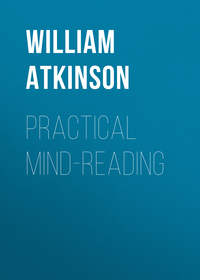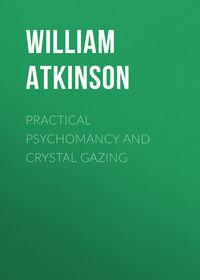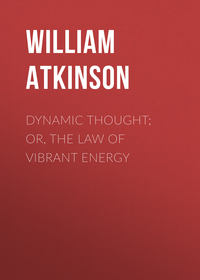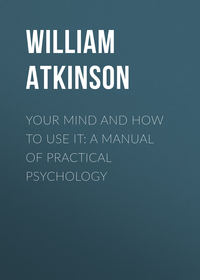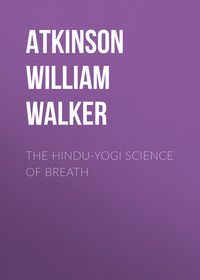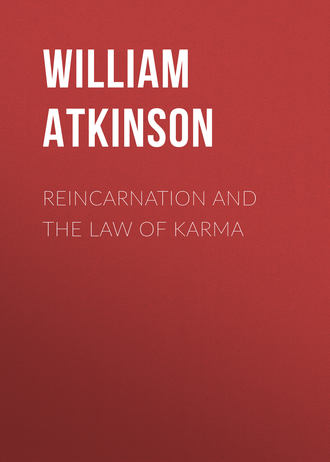
Reincarnation and the Law of Karma
And so the story proceeds. Reference to the many works written on the subject of the future life of the soul will supply many more instances of the glimpses of recollection of past incarnations. But why spread these instances over more pages? The experience of other people, while of scientific interest and value as affording a basis for a theory or doctrine, will never supply the experience that the close and rigid investigator demands. Only his own experiences will satisfy him – and perhaps not even those, for he may consider them delusions. These experiences of others have their principal value as corroborative proofs of one's own experiences, and thus serve to prove that the individual experience was not abnormal, unusual, or a delusion. To those who have not had these glimpses of recollection, the only proof that can be offered is the usual arguments in favor of the doctrine, and the account of the experiences of others – this may satisfy, and may not. But to those who have had these glimpses – particularly in a marked degree – there will come a feeling of certainty and conviction that in some cases is as real as the certainty and conviction of the present existence, and which will be proof against all argument to the contrary. To such people the knowledge of previous existences is as much a matter of consciousness as the fact of the existence of last year – yesterday – a moment ago – or even the present moment, which slips away while we attempt to consider it. And those who have this consciousness of past lives, even though the details may be vague, intuitively accept the teachings regarding the future lives of the soul. The soul that recognizes its "oldness" also feels its certainty of survival – not as a mere matter of faith, but as an item of consciousness, the boundaries of time being transcended.
But there are other arguments advanced in favor of Reincarnation, which its advocates consider so strong as to entitle them to be classed as "proofs." Among these may be mentioned the difference in tastes, talents, predispositions, etc., noticeable among children and adults, and which can scarcely be attributed to heredity. This same idea carries one to the consideration of the question of "youthful genius," "prodigies," etc.
It is a part of this argument to assume that if all souls were freshly created, by the same Creator, and from the same material, they would resemble each other very closely, and in fact would be practically identical. And, it is urged, the fact that every child is different in tastes, temperament, qualities, nature, etc., independent of heredity and environment, then it must follow that the difference must be sought for further back. Children of the same parents differ very materially in nature, disposition, etc.; in fact, strangers are often more alike than children of the same parents, born within a few years of each other, and reared in the same environment. Those having much experience with young babies know that each infant has its own nature and disposition, and in which it differs from every other infant, although they may be classed into groups, of course. The infant a few hours born shows a gentleness, or a lack of it – a yielding or a struggle, a disposition to adjust itself, or a stubbornness, etc. And as the child grows, these traits show more plainly, and the nature of the individual asserts itself, subject, of course, to a moulding and shaping, but always asserting its original character in some way.
Not only in the matter of disposition but in the matter of tastes, tendencies, moral inclinations, etc., do the children differ. Some like this, and dislike that, and the reverse; some are attracted toward this and repelled by that, and the reverse; some are kind while others are cruel; some manifest an innate sense of refinement, while others show coarseness and lack of delicate feeling. This among children of the same family, remember. And, when the child enters school, we find this one takes to mathematics as the duck does to water, while its brother loathes the subject; the anti-arithmetic child may excel in history or geography, or else grammar, which is the despair of others. Some are at once attracted to music, and others to drawing, while both of these branches are most distasteful to others. And it will be noticed that in the studies to which the child is attracted, it seems to learn almost without effort, as if it were merely re-learning some favorite study, momentarily forgotten. And in the case of the disliked study, every step is attended with toil. In some cases the child seems to learn every branch with the minimum effort, and with practically no effort; while in other cases the child has to plod wearily over every branch, as if breaking entirely new ground. And this continues into after life, when the adult finds this thing or that thing into which he naturally fits as if it were made for him, the knowledge concerning it coming to him like the lesson of yesterday.
We know of a case in which a man had proved a failure in everything he had undertaken up to the age of forty, when his father-in-law, in disgust, placed him at the head of an enterprise which he had had to "take over" for a bad debt. The "failure" immediately took the keenest interest in the work, and in a month knew more about it than many men who had been in the concern for years. His mind found itself perfectly at home, and he made improvement after improvement rapidly, and with uniform success. He had found his work, and in a few years stepped to the front rank in the country in that particular line of business. "Blessed is he that hath found his work." Reincarnationists would hold that that man had found his work in a line similar in its mental demands with that of his former life or lives – not necessarily identical in details, but similar in its mental requirement. Instances of this thing are to be seen all around us. Heredity does not seem to account for it – nor does environment answer the requirements. Some other factor is there – is it Reincarnation?
Allied to this phenomena is that of "youthful genius" – in fact, genius of any age, for that matter, for genius itself seems to be out of the category of the ordinary cause of heredity and environment, and to have its roots in some deeper, richer soil. It is a well-known fact that now and then a child is born which at a very early age shows an acquaintance with certain arts, or other branches of mental work, which is usually looked for only from those of advanced years, and after years of training. In many cases these children are born of parents and grandparents deficient in the particular branches of knowledge evidenced by the child. Babes scarcely able to sit on the piano stool, or to hold the violin, have begun to play in a way that certainly indicated previous knowledge and technique, often composing original productions in an amazing manner. Other young children have begun to draw and design without any instruction whatever. Others have shown wonderful mathematical ability, there being several cases on record where such children have performed feats in mathematics impossible to advanced adults teaching the same lines. What are the cause of these phenomena? Is it Reincarnation?
As Figuier said, years ago: "We hear it said every day that one child has a mathematical, another a musical, another an artistic turn. In others we notice savage, violent, even criminal instincts. After the first years of life these dispositions break out. When these natural aptitudes are pushed beyond the usual limit, we find famous examples that history has cherished, and that we love to recall. There is Pascal, mastering at the age of twelve years the greater part of Plane Geometry without any instruction, and not a figment of Calculus, drawing on the floor of his chamber all the figures in the first book of Euclid, estimating accurately the mathematical relations of them all – that is, reconstructing for himself a part of descriptive Geometry; the herdsman Mangia Melo, manipulating figures, when five years old, as rapidly as a calculating machine; Mozart, executing a sonata on the pianoforte with four-years-old fingers, and composing an opera at the age of eight; Theresa Milanollo, playing the violin at four years, with such eminent skill that Baillot said she must have played it before she was born; Rembrandt, drawing with masterly power before he could read." The same authority says, in reference to the fact that some of these prodigies do not become famous in their after years, and that their genius often seems to flicker out, leaving them as ordinary children: "That is easily understood. They come on earth with remarkable powers acquired in an anterior existence, but they have done nothing to develop their aptitudes; they have remained all their lives at the very point where they were at the moment of their birth. The real man of genius is he who cultivates and improves incessantly the great natural aptitudes that he brought into the world."
There is an interesting field for study, thought and investigation, along the lines of the early development of traits, tendencies, and thought in young children. Here evidently will be found the answer to many problems that have perplexed the race. It is true that heredity and environment plays an important part, but nevertheless, there seems to be another element working in the case, which science must have to reckon with in making up its final conclusions. Is that "something" connected with the "soul" rather than the mind of the child? Is that "something" that which men call Metempsychosis – Re-Birth – Reincarnation?
Along the same lines, or thought, lie the great questions of instinctive Like and Dislike – Loves and Hates – that we find among people meeting as strangers. From whence come those strange, unaccountable attractions and repulsions that many feel when meeting certain strangers, who could never have occasioned such feelings in the present life, and which heredity does not account for? Is it merely an absurd, irrational, fancy or feeling; is it the result of natures inharmonious and discordant; is it remnants of inherited ancestral feelings toward similar individuals hated, loved or feared; is it a telepathic sensing of certain elements in the other; or is it a manifestation of the feelings experienced in a past existence? Is this phenomena to be included in the Proofs of Reincarnation? Many people think that in Reincarnation the only answer may be found.
CHAPTER XI
Arguments Against Reincarnation
The honest consideration of any subject necessitates the examination of "the other side of the case," as well as the affirmative side. We have given much space to the presentation and consideration of the arguments advanced by those convinced of the truth of Reincarnation, and before closing our work we think it well to give at least a little glimpse of "the other side" as it is presented by the opponents of the doctrine, together with the reply to the same usually made by the Reincarnationists.
The first adverse argument usually presented is that the advocates of Reincarnation have not established the existence of a "soul" which may reincarnate; nor have they proven its nature, if it does exist. The natural reply to this is that the doctrine of Reincarnation is not called upon to establish the proof of the existence of a "soul," as the idea of existence of the soul practically is universal, and, therefore, "axiomic" – that is, it is a truth that may be considered as an "axiom," or self-evident truth, worthy of being assumed as a principle, necessary to thought on the subject, a proposition which it is necessary to take for granted, an established principle of thought on the subject. Strictly speaking, perhaps the fact of the existence of the soul is incapable of material proof, except to those who accept the fact of proven "spirit return," either in the shape of unmistakable manifestation of the disincarnate soul by materialization, or by equally unmistakable manifestation in the shape of communications of some sort from such discarnate soul. Science does not admit that there are any real "proofs" of the existence of a "soul" which persists after the death of the body – but all religious, and at least the older philosophical thought, generally agrees that the existence of such a soul is a self-evident fact, needing no proofs. Many regard the statement of Descartes: "I think, therefore I am," as a logical proof of the existence of an immaterial soul, and others hold that the self-consciousness of every human being is sufficient proof that the Ego, or "I," is a something immaterial, ruling the material body which it inhabits. And so the Reincarnationists claim that this demand upon them for proof of the existence of the soul is not a fair one, because such discussion belongs to the more general field of thought; that they are justified in starting with the idea that the soul does exist, as an axiomic truth; and that their real task is to establish, not that the soul exists, but that it reincarnates after the death of the body. As Figuier says, "The difficulty is not to prove that there is a spiritual principle in us that resists death, for to question the existence of this principle we must doubt thought. The true problem is to ascertain if the spiritual and immortal principle within us is going to live again after death, in ourselves or somebody else. The question is, Will the immortal soul be born again in the same individual, physically transformed – into the same person?" As to the other objection, that the Reincarnationists have not proven the nature of the soul, to which many of the advocates of the doctrine feel it necessary to reply at great length and with much subtle reasoning, we feel that the objection is not well taken. So far as Reincarnation is concerned, if it be taken as an axiom that the soul really exists, that is sufficient as a beginning for the argument in favor of the doctrine, and the proof or disproof of any special theory regarding the nature of the soul is outside of the main question, so we shall not consider it here. It is possible to think of the soul as a reincarnating entity, whether it be a monad, duad, triad, or septenary being.
The second objection usually made is that Reincarnation cannot be true, else we would remember the incidents of our past lives, clearly and distinctly, the fact that the majority of persons have no such recollection, being held to be a disproof of the doctrine. The reply to this objection is (1) that it is not true that people do not remember the events of their past lives, the instances quoted by us, and similar ones happening to others, together with the fact that nearly every one remembers something of the past, showing that the objection is not correctly stated. And (2) that the fact that we have but a very cloudy and imperfect recollection is not an objection at all, for have we a clear recollection of the events of our infancy and childhood in this life? Have we a clear recollection of the events of twenty years ago, outside of a few scattered instances, of which the majority are only recalled when some associated fact is mentioned? Are not the great majority of the events of our present life completely forgotten? How many can recall the events of the youthful life? Old companions and friends are completely forgotten or only recalled after much thought and assistance in the way of suggested associations. Then again, do we not witness a complete forgetfulness in cases of very old people who relapse into a state of "second childhood," and who then live entirely in the present, the past having vanished for them. There are cases of people having grown old, and while retaining their reasoning faculties, were as children, so far as the past was concerned. A well-known writer, when in this state, was wont to read the books that he had written, enjoying them very much and not dreaming that he was their author. Professor Knight says of this matter: "Memory of the details of the past is absolutely impossible.
"The power of the conservative faculty, though relatively great, is extremely limited. We forget the larger portion of experience soon after we have passed through it, and we should be able to recall the particulars of our past years, filling all the missing links of consciousness since we entered on the present life, before we were in a position to remember our ante-natal experience. Birth must necessarily be preceded by crossing the river of oblivion, while the capacity for fresh acquisition survives, and the garnered wealth of old experience determines the amount and characters of the new." Loss of memory is not loss of being – or even loss of individuality or character.
In this connection, we must mention the various instances of Double Personality, or Lost Personality, noted in the recent books on Psychology. There are a number of well authenticated cases in which people, from severe mental strain, overwork, etc., have lost the thread of Personality and forgotten even their own names and who have taken up life anew under new circumstances, which they would continue until something would occur to bring about a restoration of memory, when the past in all of its details would come back in a flash. The annals of the English Society for Psychical Research contain quite a number of such cases, which are recognized as typical. Now, would one be justified in asserting that such a person, while living in the secondary personality and consequently in entire ignorance of his past life, had really experienced no previous life? The same "I" was there – the same Ego – and yet, the personality was entirely different! Is it not perfectly fair and reasonable to consider these cases as similar to the absence of memory in cases of Reincarnation?
Let the reader lay down this book, and then endeavor to remember what happened in his twelfth year. He will not remember more than one or two, or a half dozen, events in that year – perhaps not one, in the absence of a diary, or perhaps even with the aid of one. The majority of the happenings of the three hundred and sixty-five days of that year are as a blank – as if they never had happened, so far as the memory is concerned. And yet, the same "I," or Ego, persists, and the person's character has certainly been affected and influenced by the experiences and lessons of that year. Perhaps in that year, the person may have acquired certain knowledge that he uses in his everyday life. And so, in this case, as with Reincarnation, the "essence" of the experiences are preserved, while the details are forgotten. For that is the Reincarnationist contention. As a matter of fact, advanced occultists, and other Reincarnationists, claim that nothing is really forgotten, but that every event is stored away in some of the recesses of the mind, below the level of consciousness-which idea agrees with that of modern psychologists. And Reincarnationists claim that when man unfolds sufficiently on some higher plane, he will have a full recollection of his past experiences in all of his incarnations. Some Reincarnationists claim that as the soul passes from the body all the events of that particular life pass rapidly before its mind, in review, before the waters of Lethe, or oblivion, causes forgetfulness.
Closely allied to the last mentioned argument against Reincarnation is the one that as the memory of the past life is absent, or nearly so, the new personality is practically a new soul, instead of the old one reincarnated, and that it is unreasonable and unjust to have it enjoy or suffer by reasons of its experiences and acts in the previous life. We think that the answers to the last mentioned objection are answers to this one also. The "I," Ego, or Individuality, being the same, it matters not if the details of the old Personality be forgotten. You are the same "I" that lived fifty years ago in the same body – or even ten years ago – and you are enjoying certain things, or suffering from certain things, done or left undone at the previous time, although you have forgotten the incidents. The impress of the thing is on your Character, and you are today largely what you are by reason of what you have been in past years, though those years are forgotten by you. This you will readily admit, and yet the argument of the Reincarnationists is merely an extension of the same idea. As Figuier says: "The soul, in spite of its journeys, in the midst of its incarnations and divers metamorphoses remains always identical with itself; only at each metempsychosis, each metamorphosis of the external being, improving and purifying itself, growing in power and intellectual grasp."
Another argument against Reincarnation is that it is not necessary, for the reason that Heredity accounts for all of the facts claimed as corroborative of Reincarnation. Answering this the advocates of the doctrine insist that Heredity does not account for all the facts, inasmuch as children are born with marked talents and genius, while none of their family for generations back have displayed any such tendencies. They also claim that if Heredity were the only factor in the case, there would be no advance in the races, as the children would be precisely like their ancestors, no variety or improvement being possible. But it must be remembered that Reincarnationists do not deny certain effects of Heredity, particularly along physical lines, and to an extent along mental lines, in the way of perpetuating "tendencies," which, however, are and may be overcome by the individuality of the child. Moreover, the doctrine holds that one of the laws of Rebirth is that the reincarnating soul is attracted to parents harmonious to itself, and likely to afford the environments and association desirable to the soul. So in this way the characteristics likely to be transmitted to the offspring are those which are sought for and desired by the reincarnating soul. The law of Rebirth is held to be as exact and certain as the laws of mathematics or chemistry, the parents, as well as the child, forming the combination which brings forth the rebirth. Rebirth is held to be above the mere wish of the reincarnating soul – it is in accordance with an invariable natural law, which has Justice and Advancement as its basis.
Another argument against Reincarnation is that it holds that human souls are reborn as animals, in some cases. This objection we shall not discuss, for the reason that the advanced ideas of Reincarnation expressly forbid any such interpretation, and distinctly deny its legitimate place in the doctrine. Among some of the primitive people this idea of transmigration in the bodies of animals has been held, but never among advanced occultists, or the leaders in philosophical thought favoring Reincarnation. Reincarnation teaches the Evolution of the soul from lowly forms to higher, but never the Devolution or going back into animal forms. A study of the doctrine of Reincarnation will dispel this erroneous idea from the mind of an intelligent person.
Another favorite argument is that it is repulsive to the mind and soul of the average person. Analysis of this objection will show that what is repugnant to the person is usually the fear that he will be born again without a memory of the present, which seems like a loss of the self. A moment's consideration will show that this objection is ill founded. No one objects to the idea of living in the same body for, say, ten years or twenty years more, in health. But at the end of that ten or twenty years he will be practically a different person, by reason of the new experiences he has undergone. Persons change very much in twenty years, and yet they are the same individuals – the same "I" is there with them. And at the end of the twenty years they will have forgotten the majority of the events of the present year, but they do not object to that. When one realizes that the Individual, or "I," is the Real Self instead of the Personality, or the "John Smith, grocer, aged 36," part of them – then will they cease to fear the loss of the personality of the day or year. They will know that the "I" is the "Self" – the same yesterday, today and tomorrow. Be the doctrine of Reincarnation true or false, the fact remains that so long as YOU exist, it will be the same "I" in you that you will know that "I am." It will always be "I AM – HERE – NOW," with you, be it this moment, or a hundred years, or a million years hence. YOU can never be SOMEONE ELSE, no matter what form you wear, nor by what name you are known, nor what personality you may be acting through, nor in what place you may have your abode, nor on what plane of existence you may be. You will always be YOURSELF – and, as we have just said, it will always be "I AM – HERE – NOW" with You. The body, and even the Personality, are things akin to garments which you wear and take off without affecting your Real Self.




